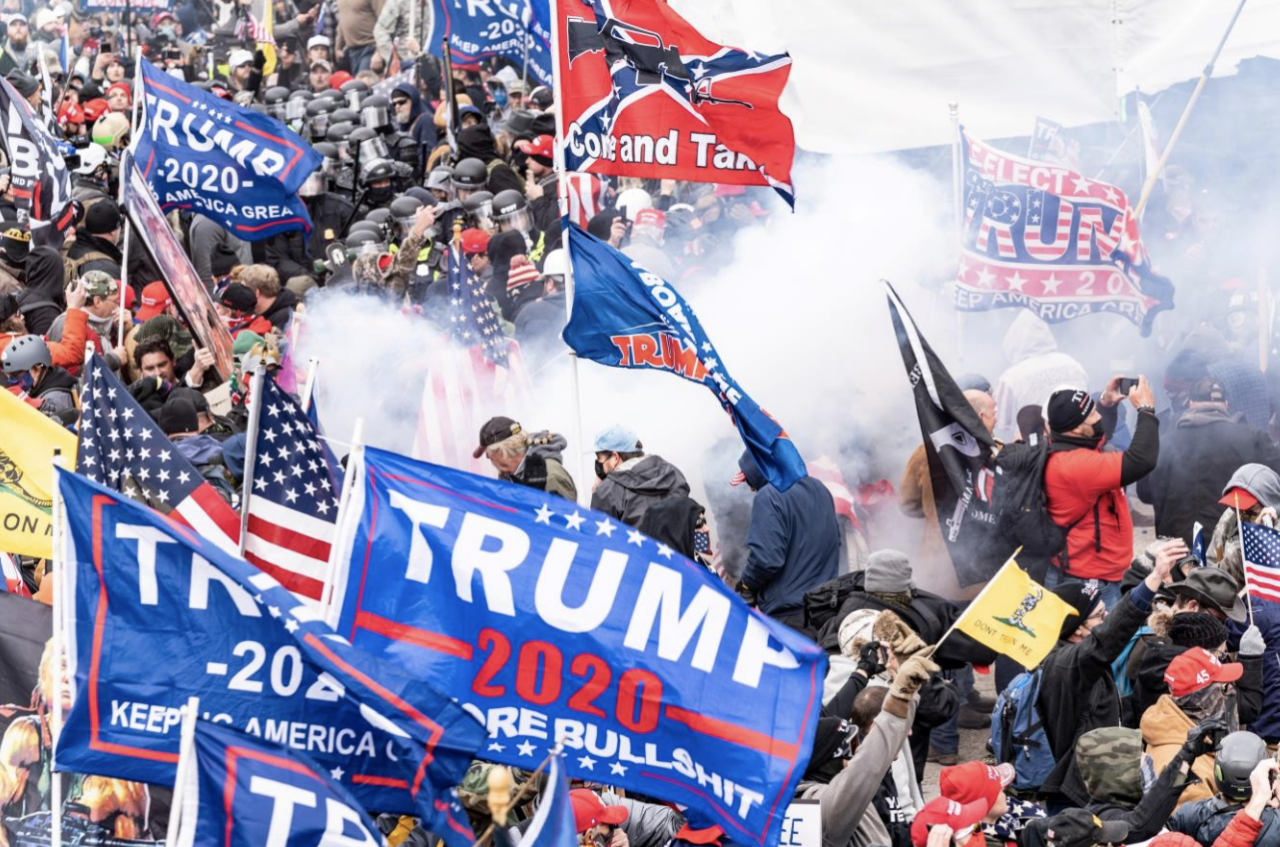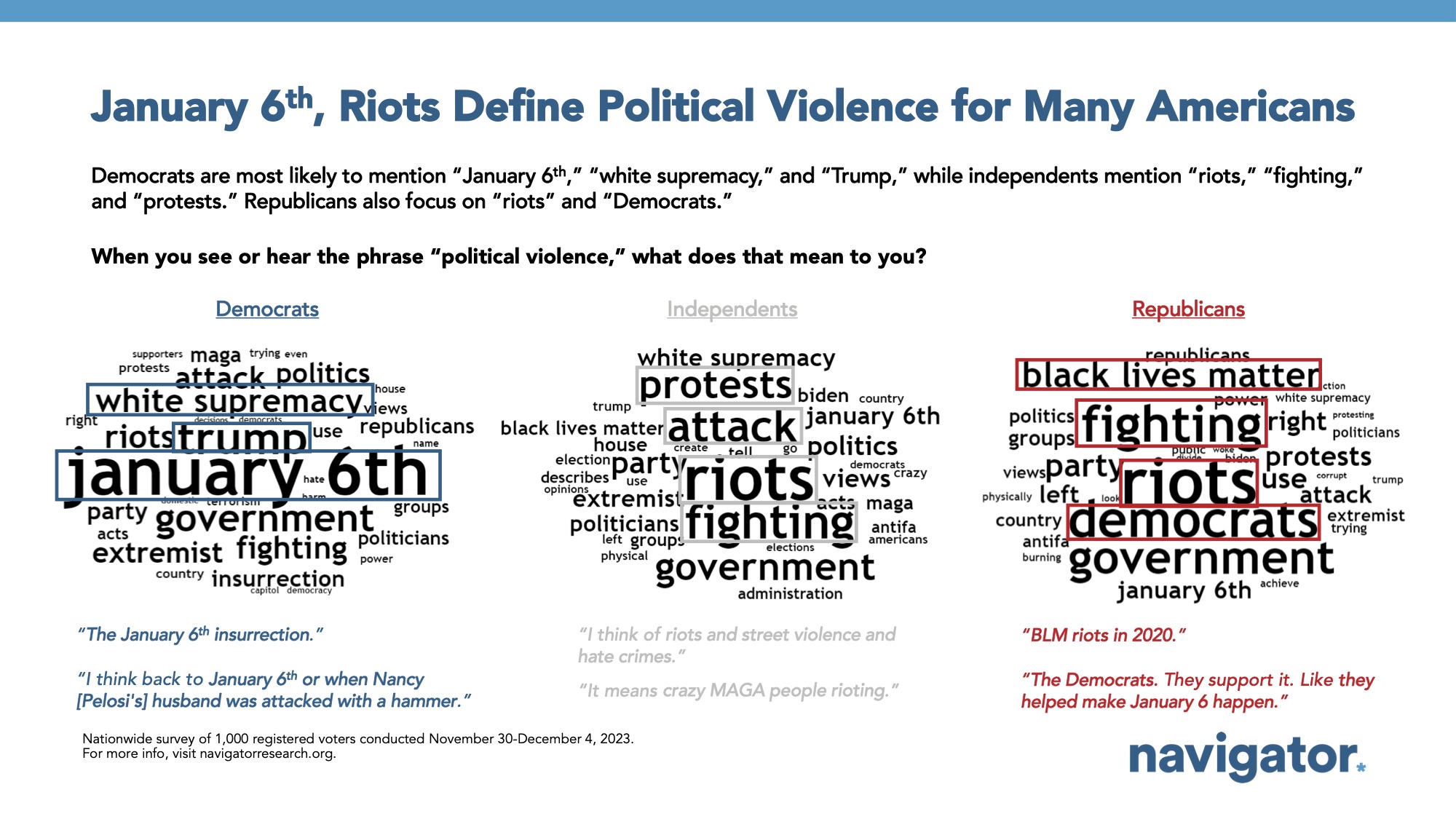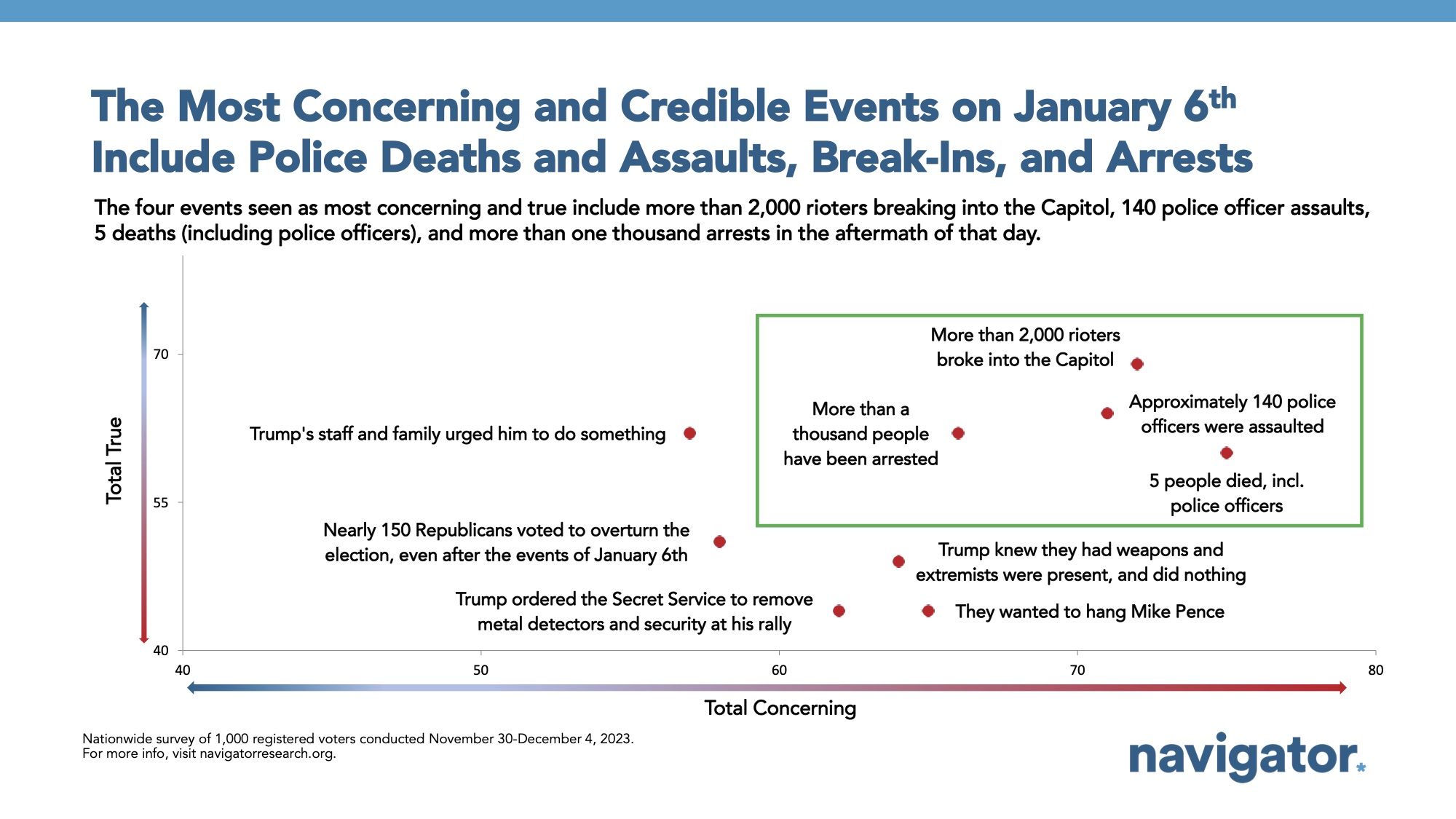Memo: Messaging on Political Extremism
If you read no further, take away that:
- Many Americans see political violence, particularly January 6th, as a salient threat.
- 83 percent of Americans are concerned about political violence, nearly 42 percent of them are “very” concerned. A similar share of Americans (85 percent) are concerned about political violence in the United States in the future.
- Many Americans center Donald Trump in their recollection of January 6th. Progressives can and should broaden the narrative on political violence beyond Trump to include congressional Republicans who are now defending the insurrection and insurrectionists. This is a critical entrypoint to linking advocacy against attacks on our democracy to advocacy for the broader progressive policy agenda.
Flashing back
Three years ago, a majority of Republican members of Congress and leaders of the incumbent Executive Branch embraced the Big Lie and egged on over 2,000 people to march down Pennsylvania Avenue on a cold January afternoon and break into the Capitol. Most Americans, nearly seven in ten, watched the events of January 6th happen live on TV (or in their Twitter feed). In Navigator’s survey immediately following, more than four out of every five Americans surveyed condemned the events of January 6th. Their greatest concerns were more violence to come: for Democrats, that meant “more violence from Trump supporters” and that “our democracy is at risk if we can’t have peaceful transitions of power.”
Today’s challenge
Trump has crossed the 50 percent threshold in Republican primary polling. Mike Johnson, who orchestrated the strategy to overturn the 2020 election is now Speaker of the House. And a Republican caucus that counts election deniers in its body is now pushing a policy agenda that would further undermine our democracy — including as soon as the 2024 election. And despite near universal concern over political violence and the association of Donald Trump with the events of January 6th, nearly one in five are not sure which party is more prone to political violence.
This poses two interconnected questions for those within the progressive space advocating for the protection of our democracy in the face of extremism:
- Does advocating against political violence actually have salience and does January 6th have a place in that advocacy?
- If so, how should we define political violence beyond the events of January 6th, 2021, and how?
What the data tells us
Through Navigator’s tracking of public opinion over the last three years, we have found that Americans have continued to view the actions of Trump supporters that day unfavorably and worry they may repeat those actions — a view that largely remains unchanged. In fact, within our most recent survey 83 percent of Americans are concerned about political violence, a plurality of whom are “very” concerned (42 percent). However, within our recent survey, when asked what “political violence” meant we see more diversity in viewpoint: Democrats most often cited “January 6th” and “Trump,” independents cited “attacks,” “protests,” “riots,” and “fighting,” and Republicans frequently cited “fighting,” “riots,” “Democrats,” and “Black Lives Matter.”
We learn from associations like these and the potency of American recollections of January 6th, the threat of political violence is still on the minds of the American people, but we can also see that how ‘political violence’ is defined is up for debate – and with that, who is to blame.
This is also a clear signal that January 6th does not yet have a universal position in the definition of political violence, but that there is clear openness to define political violence around January 6th for independents.
Taken together, this is a clear signal that advocating against political violence is persuasive, but that progressives must first build the fundamental connection between January 6th and political violence for all Americans before we can work to extend the definition of political violence past the singular date of January 6th.
Persuasive images and language
Three years on, while the attack on January 6th is embedded in American political memory, the American people broadly do not remember the full scale of the attack and need to be reminded of its violence and its targets. That being said, progressives don’t need to cite a past, historic or future, potential example of a threat to democracy – because the images of the riot at the Capitol are readily available in stills and video.
Progressives should use plain language that consistently uses proven numbers and facts while employing the strong visual imagery of January 6th’s insurrection to remind constituents of the violence of that day, who it was directed toward, and cite specific examples of that violence’s impact while pivoting to advocating for a strong democracy.
To establish the most effective language surrounding January 6th and political violence more broadly, Navigator continues to ground our research and analysis in the framework that political violence has become increasingly subjective and facts array along a scale of believability influenced by a number of factors like media consumption and partisanship. For that reason, Navigator tests each event on a dual axis measuring which events are most concerning and which are most believable.
The following statements resonate among the public as both the most true and most concerning in our most recent survey. This is a critical finding and underscores our recommendation to advocate in plain language that does not feel subjective or exaggerated:
- More than 2,000 rioters ultimately broke into the Capitol, many of whom vandalized and looted parts of the building (69 percent true, 72 percent concerning);
- Approximately 140 police officers were assaulted by rioters (64 percent true, 71 percent concerning);
- Five people died as a result of the events on January 6th, including Capitol police officers (60 percent true, 75 percent concerning); and,
- More than a thousand people have been arrested for their actions on January 6th (62 percent true, 66 percent concerning).
Extending Culpability for Culpable Congressional Republicans
While Donald Trump is at the epicenter of both perceptions of political violence and what happened on January 6th, it is also important to link the events of that day to MAGA Republicans who continue engaging in behavior that provokes political violence. As of today, the Republican Party is now more seen as prone to political violence than the Democratic Party by 11 points (47 percent compared to 36 percent), but nearly one in five are not sure which party is more prone to political violence. Those respondents are persuadable through your advocacy work.
To communicate the association of Republicans in Congress within your advocacy, the American peoples’ top concerns with their conduct include that congressional Republicans:
- Continue to allow the white supremacist factions present at the January 6th attack to play a dominant role in deciding the direction of the Republican Party (71 percent concerning, including 71 percent of independents);
- Voted against investigating basic facts about what happened at the attack at the Capitol building on January 6th (71 percent concerning, including 70 percent of independents); and,
- Some Republican members assisted or encouraged the organizers of the attack on January 6th (70 percent concerning, including 73 percent of independents).
NOTE: These links are critical in your advocacy work and data shows they are equally persuasive to independents and the sampled group on the whole.
There are two paths forward for effective messaging that we recommend advocates pursue:
- Messages that combined both facets of relaying credible and concerning facts about the attack on January 6th that also broaden the aperture from Trump’s involvement to MAGA Republicans.
- Messages that tie extremism into our advocacy for rights, freedoms, and a fairer economic messaging.
More than 2,000 rioters entered the Capitol looting and vandalizing parts of the building, 140 police officers were attacked by rioters, and 5 people died as a result of the attack. But insurrectionists on the outside didn’t do this on their own – MAGA extremists in Congress assisted or encouraged the organizers of January 6th, then after the dust had settled, voted against investigating basic facts about the attack. Today they continue to give the same white supremacist factions present at the January 6th insurrection a seat at the table setting the direction of the Republican Party.
Furthering attacks on our government and weakening trust in American democracy is not disconnected from the agenda of many Republicans in Congress – it is an essential step to furthering their ultimate goal: tax handouts to the wealthy and an extremist policy agenda that limits opportunity and removes fundamental rights for everyday people.
The decision of many congressional Republicans since 2021 to fall in line with the extremist parts of their party that attempted to manufacture a violent transition of power is a means to an end: extreme policies that center corporations and profits over the people they govern. Progressives should continue to explore how we can make the connection between our opposition to extremism and political violence to our support for broader populist, economic messaging that resonates with a lot of the country across race, geography, and socioeconomic status.


